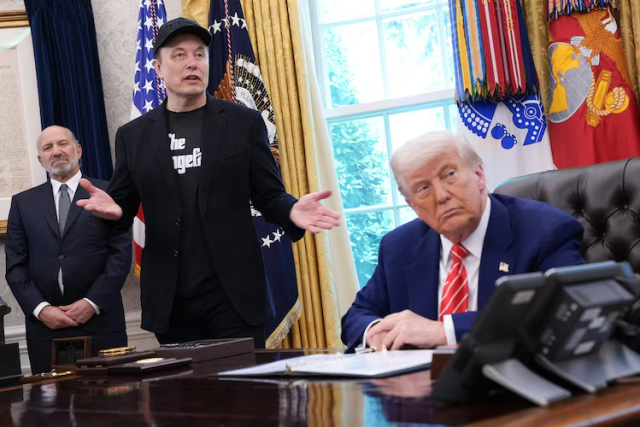Elon Musk Blasts Trump-Backed Megabill in Fierce Social Media Critique
In a scathing rebuke of a major piece of legislation, Elon Musk has once again made headlines by calling the “One Big Beautiful Bill Act” — a central pillar of former President Donald Trump’s revived legislative agenda — a “disgusting abomination.” Musk, CEO of Tesla and SpaceX, did not hold back as he posted on X (formerly Twitter), condemning the bill’s multi-trillion-dollar deficit projections and its burden on American taxpayers.

“I’m sorry, but I just can’t stand it anymore. This massive, outrageous, pork-filled Congressional spending bill is a disgusting abomination. Shame on those who voted for it: you know you did wrong. You know it,” Musk wrote.
A Closer Look at the Bill: What’s in the “One Big Beautiful Bill Act”?
The controversial legislation — dubbed the “One Big Beautiful Bill Act” — is a sweeping fiscal package that seeks to revive and extend the 2017 Trump-era tax cuts, expand military and border security funding, and slash critical safety net programs like Medicaid and SNAP.
According to the nonpartisan Congressional Budget Office (CBO), the bill will add an estimated $3.8 trillion to the current $36.2 trillion U.S. national debt over the next decade. Critics argue that the bill heavily favors defense contractors and wealthy Americans, while reducing support for vulnerable communities.
Key Provisions Include:
- Extension of 2017 Trump tax cuts
- $300 billion increase in defense spending
- $80 billion allocated to border infrastructure
- Reductions in Medicaid and food stamp programs
- Estimated $2.5 trillion annual budget deficit increase
Musk Sounds the Alarm: “Congress Is Making America Bankrupt”
Elon Musk’s criticism didn’t end with a single post. He followed up with another bombshell, stating:
“This bill will massively increase the already gigantic budget deficit to $2.5 trillion (!!) and burden American citizens with crushingly unsustainable debt. Congress is making America bankrupt.“
Musk’s message was clear: the financial trajectory being laid out by this legislation is not only irresponsible but dangerously unsustainable for future generations. His comments sparked widespread debate across social media and within financial circles, with many praising his boldness while others accused him of political meddling.
Political Response: GOP and White House Push Back Against Musk
House Speaker Mike Johnson was quick to respond to Musk’s criticism, telling reporters:
“For him to come out and pan the whole bill is to me just very disappointing, very surprising… That is a dangerous thing for Elon or anyone who cares about the U.S. economy to be meddling with.“
Meanwhile, Senate Majority Leader John Thune dismissed Musk’s concerns, stating:
“We obviously respect everything that Elon did with DOGE. On this particular issue, we have a difference of opinion.”
Thune suggested Musk was relying on outdated economic models, claiming the bill will actually lead to long-term growth and fiscal health. However, many economists remain skeptical of such claims, especially given the sheer scale of the projected deficit and national debt increases.
White House Doubles Down: “This Is One Big, Beautiful Bill”
Despite the backlash, the Biden administration (continuing to implement elements of Trump’s prior economic plans) stood firmly behind the bill. White House press secretary Karoline Leavitt dismissed Musk’s statements, saying:
“Look, the president already knows where Elon Musk stood on this bill. It doesn’t change the president’s opinion. This is one big, beautiful bill and he’s sticking to it.“
While Musk voiced his “disappointment” during a CBS News interview earlier this week, the administration is forging ahead, pushing the bill through Senate negotiations with aggressive lobbying and direct outreach to lawmakers.
Economic Implications: A Trillion-Dollar Gamble
The debate around the bill centers not only on its ideological merits but also its massive economic implications:
- The CBO estimates a $3.8 trillion increase in debt over the next decade.
- Annual budget deficits projected to hit $2.5 trillion, a historic high.
- Cuts to essential services like Medicaid and SNAP could leave millions vulnerable.
- Increased defense and border spending seen by many as a misplaced priority in a time of social crisis.
Critics argue that this level of spending with insufficient revenue offsets could trigger inflationary pressure, weaken the dollar, and reduce the country’s long-term fiscal flexibility.
Musk’s Growing Political Voice
Musk, long known for his entrepreneurial genius, has increasingly positioned himself as a political and cultural commentator. From weighing in on COVID-19 lockdowns to now slamming federal legislation, Musk’s X platform posts regularly ignite national discourse.
His recent comments suggest he sees a growing disconnect between political decision-making and economic reality. In targeting this particular bill, Musk is staking his voice against what he views as irresponsible governance — a viewpoint shared by libertarians, fiscal conservatives, and centrists concerned with debt sustainability.
Public Reaction: Divided Yet Concerned
The American public remains deeply divided on the bill. Supporters argue it’s necessary for national defense and economic stimulation, while critics echo Musk’s fears of ballooning debt and reckless fiscal policy. Independent polls show declining confidence in Congress’s ability to manage the economy, with rising concern about inflation, national debt, and entitlement program stability.
Conclusion: A Defining Battle Over America’s Fiscal Future
Elon Musk’s explosive comments about the “One Big Beautiful Bill Act” reflect a broader national anxiety about economic stewardship. With the U.S. debt already exceeding $36 trillion, the question becomes whether additional spending — no matter how well-intentioned — is sustainable.
As negotiations move forward in the Senate, the nation watches closely. Will Congress heed warnings from business leaders and economists? Or will political momentum push the bill into law, debt consequences be damned?
Only time — and perhaps the 2026 elections — will tel







































